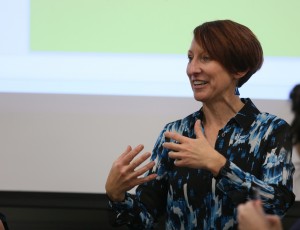
CSN Biology Professor Denise Signorelli
There was this moment in Denise Signorelli’s office. She was helping a student, and they couldn’t get the computer to do what they wanted it to do. She’s a biology professor, not a techie, so what were they going to do? The student thought maybe they’d have to try something else.
“That’s only two tries, Michael,” Signorelli said. “You don’t know me very well if you think I’m going to give up.”
She didn’t, of course. That’s not who she is.
Which helps explain why Signorelli, who has been a College of Southern Nevada professor going on 14 years now, was recently notified that she was selected for the U.S. Department of State’s Fulbright Scholar program.
The program sends about 800 American scholars and professionals every year to more than 100 countries around the world to lecture or conduct research in a wide variety of academic and professional fields.
Signorelli will be teaching cell biology in Indonesia for the 2014-15 academic year. Cell biology is the study of individual cells, what they do and how they affect one another, how diseases affect them, and how we can intervene to stop bad things from happening.
She applied to teach the discipline within a medical school in Indonesia, but hasn’t been notified yet where, exactly, she’ll be teaching.
She’s up for the adventure, no matter what.
That’s not surprising, coming from a woman who grew up in Kansas wanting to be an archaeologist, ended up falling in love with microbiology in college, kept going, researched virology, biochemistry and developmental genetics, moved to Las Vegas, got hired on at CSN, and then fell in love with teaching. With her students.
She said she already feels a kinship with her Indonesian students, even though she hasn’t met a single one. Perhaps one-third of her current biology students speak English as a second language, she said, and she is heartily impressed with how hard they work to not only do what needs to be done, but to do it well.
“I know that this subject must be really hard for them, but I don’t have the experience of trying it myself,” she said. “I wanted to have this experience to make me a better teacher. I wanted to know how it feels.”
She paused to wipe away a tear, and she smiled.
“I have these kids in class and all they want to do is be somebody,” she said. Often, she said, despite their disadvantage, these students end up being the best ones in her class.
Though she will be teaching in English, she will be living in a country with more than 200 million people spread across 1,700 islands who speak 700 different languages.
“Now,” she said, “it’s sink or swim.”
